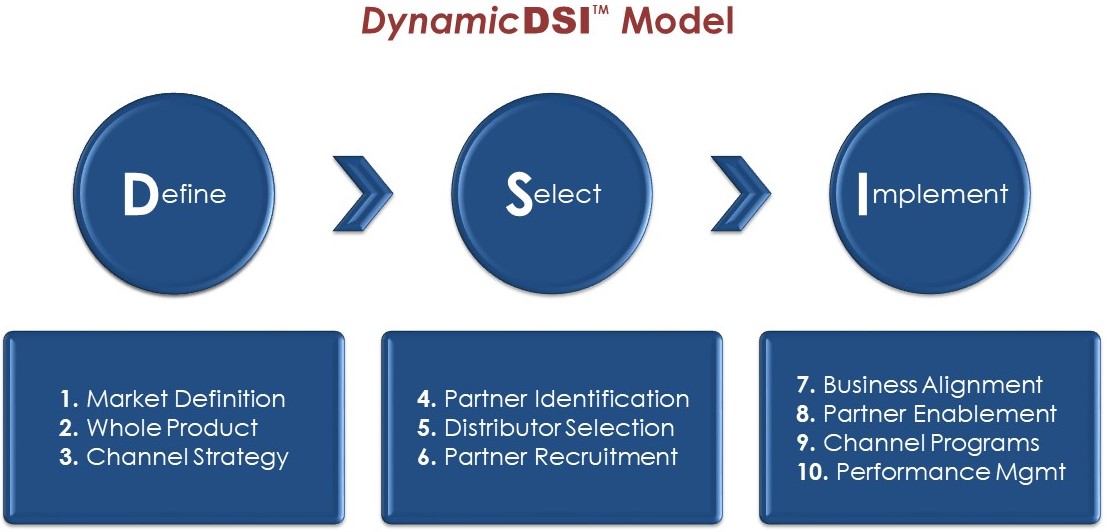A Structured & Consistent Framework With a Proven Track Record
The Channel Dynamics methodology is a culmination of research, best practices and experience. At the very core of our methodology is the DynamicDSI model – a 3 phase process, comprising 10 Steps:

1. Market Definition
We assist companies to analyse the various dynamics of the target market (competition, distribution models, customer segments, market profitability, government influence, etc) in order to establish a foundation for the appropriate channel strategy.
2. Whole Product
There is often a gap between the marketing promise to the customer, and the actual product that is shipped. The whole product typically augments the generic product with support, peripherals, training, additional software or hardware, installation instructions, etc. We identify the functions – performed by the vendor, channel or other third party – that differentiate the generic offering from the competition and create a compelling reason for the customer.
3. Channel Strategy
In our experience, many of the problems vendors face with their channel aren’t really problems with their partners at all. It’s often that the partner program and engagement model is founded on an unclear or ambiguous strategy. We can help you create the right Channel Strategy for your business, and make sure it works for you and your partners.
4. Partner Identification
A sound channel strategy is based on the “selection” of partners, not merely “collection”. It requires careful consideration of factors such as optimising the depth/breadth of the channel, minimising channel conflict, and the impact on profit margins. Our Partner Profiling model will help you identify the right partners for your business, and make sure that you select partners that can deliver on their promises.
5. Distributor Selection
For many companies, selecting the right distributor(s) can be the single biggest decision they may have to make. Should you even use distribution?Is it worth considering “sole” distribution? Which distributors should you be talking to? Our understanding of distribution and our Distribution Selection framework could mean the difference between success and failure.
6. Partner Recruitment
Most organisations will spend a significant amount of time selecting and recruiting sales staff, they typically adopt an ad-hoc approach to Partner Recruitment. We believe that you need to take just as much care in selecting your external sales partners as you do on your internal sales staff. Based on the criteria identified using our Partner Profiling model in Step 4, we will help you find the right partners, and more importantly, refine your sales message to make it compelling for partners to want to join you.
7. Business Alignment
Effective channel management begins with ensuring that all the company’s processes & procedures are aligned with the goal of working with channel partners. That includes executive management support, operational issues (pricing, order processing, technical support, database management, end-user information capture, etc) as well as sales compensation schemes. We review the skills & knowledge of vendor staff, and examine the potential for conflict between internal systems and a sound channel philosophy.
8. Partner Enablement
Partner Enablement is a significant operational step towards the partnering process and creating shared commitment towards channel productivity. It includes Training for your Partners (sales, technical, operational, etc) in addition to establishing the support infrastructure (business plans, resource allocation, commitment to vendors programs, etc) necessary to fast track the partner’s ability to sell the products.
9. Channel Programs
All reseller actions are driven by the desire to increase revenue, decrease costs, improve cash flow, leverage assets, or minimise their liabilities. This step addresses the issues that inspire partners to act. Our business processes enable you to review and fine tune your existing Channel Programs for maximum impact, and we work with you to create new programs that are relevant for partners, thereby ensuring the necessary commitment for success.
10. Performance Management
The final step in any channel methodology is the feedback & review mechanism. We outline processes to monitor and enhance channel performance, devise report cards and metrics to measure performance, and establish regular formal partner review meetings. We’ll even help you with Sales Data Analysis, so you can identify and predict performance trends. Feedback from this process also acts as the input for reviewing channel efficiencies, and assisting in the ongoing channel optimisation process.


